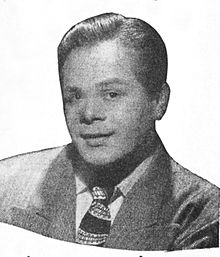Miguelito Valdés
| Miguelito Valdés | |
|---|---|
 |
|
| Background information | |
| Birth name | Miguel Ángel Eugenio Lázaro Zacarías Izquierdo Valdés Hernández |
| Also known as | Mr. Babalú |
| Born |
September 6, 1912 Havana, Cuba |
| Died | November 9, 1978 (aged 66) Bogotá, Colombia |
| Genres | Son cubano, guaracha, bolero |
| Occupation(s) | Singer |
| Instruments | Vocals, guitar, percussion |
| Years active | 1920s–1978 |
| Labels | RCA Victor |
| Associated acts | Orquesta Casino de la Playa, Orquesta Riverside |
Miguelito Valdés (September 6, 1912 – November 9, 1978), also known as Mr. Babalú, was a renowned Cuban singer. His performances were characterized by a strong voice and a particular sense of cubanismo.
Miguelito Valdés was born as Miguel Ángel Eugenio Lázaro Zacarías Izquierdo Valdés Hernández on September 6, 1912 in Havana. His father was Spanish and his mother was Mexican from Yucatán. He was born in Belén (in Old Havana), and moved to another barrio, Cayo Hueso (in Centro Habana), when his father died. In his youth he worked as an auto mechanic and was a good amateur boxer. In 1934 he won the Amateur Championship of Cuba at his weight. One of his closest friends from his days in the barrio was Chano Pozo, and in his singing style he has been called "as black a white guy as you would meet in Havana". In 1936 he married Vera Eskildsen, an aristocrate from Panama city with whom he had a son, Juan Miguel Valdés Eskildsen. In 1968 he lived in Palm Springs, California.
He got his start in the night clubs of Havana, and first attracted renown as vocalist at the Havana-Riverside Casino. Valdés began his musical career in the Sexteto Habanero Infantil, where he played, variously, the guitar, tres, double bass, timbal and sometimes sang. Soon, his capability as a singer was realized, and from that moment he was constantly in demand. After a brief spell with María Teresa Vera's Sexteto Occidente, he was one of the founding members of the Septeto Jóvenes del Cayo in 1929. In 1933 he moved to the charanga of Ismael Díaz, and then to the Charanga Gris, directed by the pianist and composer Armando Valdés Torres, and to the Orquesta Habana, directed by Estanislao Serviá.
In 1934, he made his first journey abroad, to Panama, and on his return joined the Orquesta Hermanos Castro, which was a leading band of the day. He was their lead singer until 1936. In 1937, he joined a group of top musicians who formed the Orquesta Casino de la Playa. In June 1937 Valdés and Casino de la Playa began recording for RCA-Victor, making their debut with Bruca maniguá, a song composed by Arsenio Rodríguez. He was now perhaps the top singer in Cuba, on the verge of international fame. In 1939, La Playa toured South America and Central America. By that time, their records were highly successful all around Latin America.
...
Wikipedia
